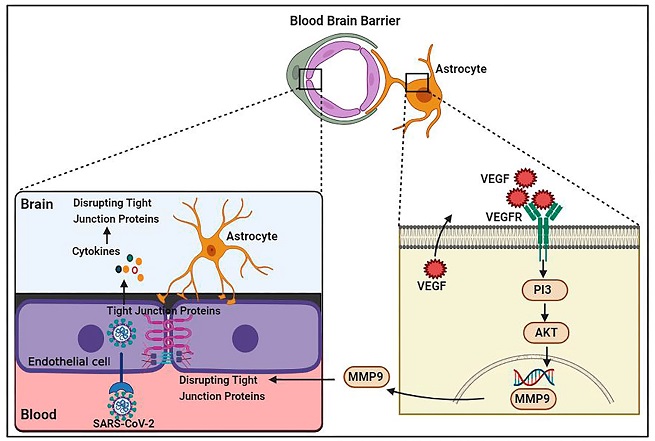University of California Researchers Warn That COVID-19 Induced Vascular Dysfunctions Contribute To Long COVID Cognitive Deficits
Thailand Medical News Aug 09, 2023 2 years, 6 months, 2 weeks, 15 hours, 17 minutes ago
COVID-19 News: The emergence of severe acute respiratory syndrome coronavirus 2 (SARS-CoV-2) in late 2019 marked a turning point in global health, as it quickly spread to become a worldwide pandemic. Initially characterized as a respiratory pathogen primarily affecting the upper respiratory system and lungs, SARS-CoV-2 has since revealed its potential to impact various organ systems, including the brain.
 Schematic representation of SARS-CoV-2 infection causing vascular dysfunction and BBB disruption. Proinflammatory cytokines result in VEGF production in astrocytes via allowing immune cells to pass through the BBB. VEGF is able to disrupt TJ proteins in brain capillary endothelial cells by triggering the phosphoinositide 3 (PI3)-kinase and AKT signaling pathways and MMP-9 upregulation, leading to BBB breakdown.
Schematic representation of SARS-CoV-2 infection causing vascular dysfunction and BBB disruption. Proinflammatory cytokines result in VEGF production in astrocytes via allowing immune cells to pass through the BBB. VEGF is able to disrupt TJ proteins in brain capillary endothelial cells by triggering the phosphoinositide 3 (PI3)-kinase and AKT signaling pathways and MMP-9 upregulation, leading to BBB breakdown.
While neurological symptoms were initially reported as a rarity, increasing evidence points to the prevalence of cognitive deficits in patients with COVID-19, even after recovery. Researchers at the University of California-San Francisco have undertaken an investigation to understand the intricate relationship between COVID-19 induced vascular dysfunctions and the long-term cognitive deficits observed in post-COVID patients.
Vascular Dysfunction and Neurological Manifestations
Beyond its respiratory impact, SARS-CoV-2 has shown an ability to infiltrate diverse organ systems, including the nervous system. Common neurological symptoms such as dizziness, headache, and altered consciousness have been observed in COVID-19 patients during hospitalization. Notably, studies using murine models have demonstrated the virus's ability to enter the central nervous system (CNS), corroborating clinical observations as reported in previous
COVID-19 News coverages.
Moreover, a significant percentage of hospitalized patients exhibit cognitive deficits, such as memory impairment, decision-making difficulties, and attention problems. These cognitive symptoms are often referred to as "brain fog" or "mental clouding," and they can persist for several months post-infection, affecting patients' daily lives and functioning.
Long-Term Cognitive Impairment and COVID-19
The phenomenon of persistent cognitive deficits following COVID-19 infection, often termed "Long COVID," has garnered attention due to its potential to impact patients' quality of life and overall functioning. A range of mechanisms has been proposed to explain these cognitive impairments, including disruption of the blood-brain barrier (BBB), neuroinflammation, synaptic dysfunction, altered neurotransmitter release, and neuronal loss. These processes, when dysregulated, contribute to long-term cognitive difficulties that persist beyond the acute phase of infection.
Role of Vascular Dysfunction in Cognitive Impairment
The study team delved into the relationship between vascular dysfunction induced by SARS-CoV-2 and subsequent cognitive deficits. The vascular system plays a crucia
l role in supplying oxygen and nutrients to various organs, including the brain. COVID-19 has been associated with direct and indirect vascular damage, leading to endothelial dysfunction and multi-organ impairment. Notably, evidence points to the disruption of tight junction proteins between endothelial cells, resulting in a compromised blood-brain barrier. This disruption facilitates the infiltration of immune cells and other particles into the brain, exacerbating brain injury.
Blood-Brain Barrier Disruption and Cognitive Dysfunction
The blood-brain barrier is a dynamic structure that regulates the exchange of molecules between the bloodstream and the brain parenchyma. It consists of brain endothelial cells, tight junction proteins, pericytes, astrocyte end processes, neural cells, and microglia. The integrity of the BBB is vital for preventing the entry of pathogens and maintaining a stable environment for proper neuronal function. COVID-19-induced inflammation, characterized by the release of pro-inflammatory cytokines, has been linked to the disruption of BBB integrity. Increased levels of cytokines such as IL-1β, IL-6, and TNF-α contribute to the degradation of tight junction proteins, resulting in increased permeability of the BBB. This compromised barrier allows for the penetration of immune cells and viral particles into the brain, triggering neuroinflammation and contributing to cognitive deficits.
Mitochondrial Dysfunction, Hypoxia, and Cognitive Impairment
COVID-19 infection has also been implicated in mitochondrial dysfunction, which plays a vital role in energy metabolism and maintaining neuronal health. The virus's interaction with host mitochondria can disrupt energy production and lead to neuronal damage. Furthermore, hypoxia, a common consequence of severe respiratory illness, can result in neural atrophy, cerebral damage, and cognitive impairment. The brain's susceptibility to oxygen deprivation, particularly in areas like the hippocampus, contributes to memory loss and other cognitive deficits observed in COVID-19 patients.
Chemokines and Cognitive Impairment
Chemokines, small signaling molecules known for their role in immune responses, have been linked to cognitive impairment in COVID-19 patients. Elevated levels of chemokines, such as CCL11, have been observed in plasma samples of long COVID cases with cognitive symptoms. These chemokines contribute to neuroinflammation, microglial activation, and white matter damage in the brain, further exacerbating cognitive deficits.
Conclusion and Future Directions
The research conducted by University of California-San Francisco researchers sheds light on the intricate interplay between COVID-19-induced vascular dysfunction and long-term cognitive deficits. Evidence points to a cascade of events initiated by SARS-CoV-2 infection, including disruption of the blood-brain barrier, neuroinflammation, mitochondrial dysfunction, and hypoxia. These processes collectively contribute to cognitive impairment observed in COVID-19 patients. Future studies are needed to comprehensively understand the exact mechanisms behind these cognitive deficits and develop targeted interventions to mitigate the impact of long COVID on cognitive function. The findings highlight the importance of considering not only the acute respiratory effects of COVID-19 but also its potential long-lasting neurological consequences.
The study findings were published in the peer reviewed journal: Biology.
https://www.mdpi.com/2079-7737/12/8/1106
For the latest
COVID-19 News, keep on logging to Thailand Medical News.
